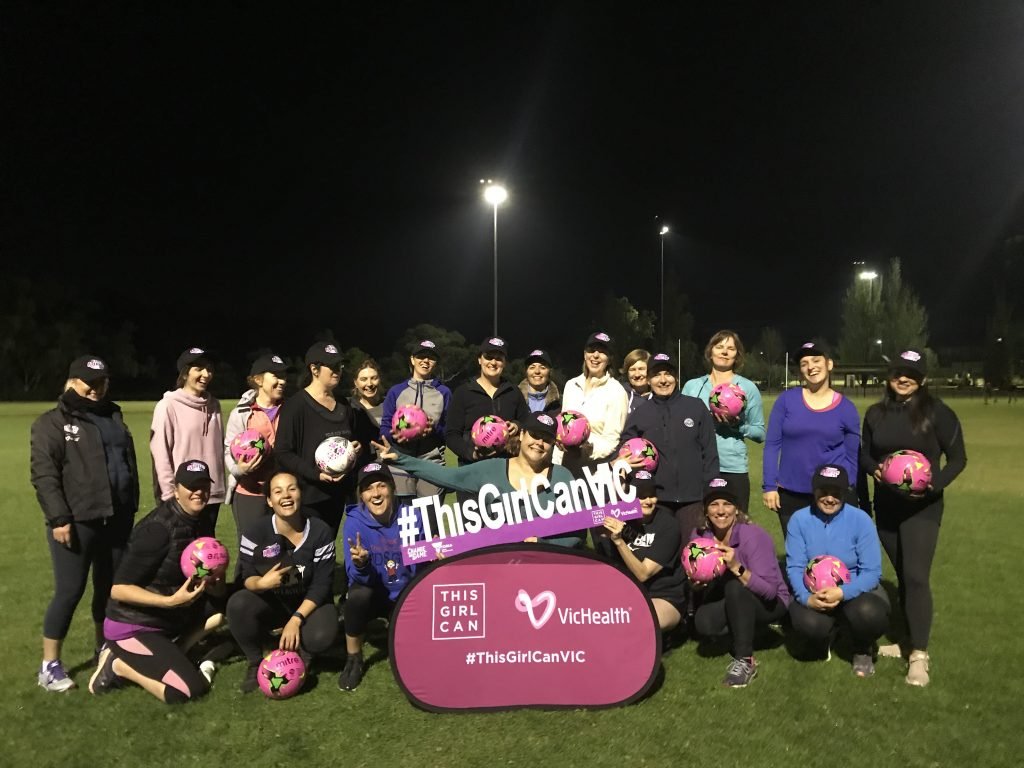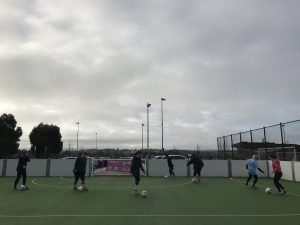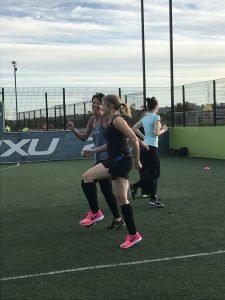“IN THE SPOTLIGHT……”
SOCCER MUMS, AN INITIATIVE OF VICHEALTH.
The “VicHealth Soccer Mums” is a programme, in Australia, to get Mums playing football for the first time, while having fun doing it. It was started up by Jen Willmott (aged 30), in 2017, and it looks like it’s going from strength to strength! We found out about VicHealth Soccer Mums when we saw a post on Instagram and were automatically inspired by the women taking up football. The videos of them learning to play are fantastic! Since then, the project appears to be growing rapidly, with various groups setting up in different areas, under the VicHealth banner. Carol Bates spoke to Jen Willmott (Project Manager of the Soccer Mums) to find out a bit more about how it all started and how fast it’s progressing.

CB: How and why did you decide to set this great initiative up?
JW: In September 2017, I was away with the Junior Matildas (Australian U17 National Team) as their team manager. I was aware that Aisling Callaghan, Football Victoria’s Women and Girls Program Coordinator, was submitting an application for funding a program that would target Women with school aged kids. I had ruled myself out of the role as they were recruiting just before and during the overseas tour.
I ended up having a Viber Phone interview with VicHealth, Football Victoria and Melbourne City FC from Thailand to secure the Project Manager role.
Retaining and engaging women, especially Mums, was identified as a pain point for the state federation. We offered limited opportunities for women to play traditional football and the skill-level and age of participants in social football varied massively. A lot of women had also had negative experiences with club land, coaches, players and/or cultural/domestic barriers. So we needed to reframe how we approached female football.
CB: When was your first session and how many Mums came along to see what it was all about? Is it for women over a certain age or is it open aged?
JW: Our first sessions were in Dec 2017. After putting in 3 months of program design, conducting focus groups and visiting similar existing programs we were ready to launch the pilot programs at two different sites. We held a standalone program in Melbourne’s east and a program at the same time as MiniRoos Kick Off (kids 3-9) to see what sort of uptake there would be. We had 25 women participate across both sites, which considering the time of the year (Christmas and hot weather) it was a good level of participation.
There is no age restriction on the program, our average age is 42 years currently. Each location can vary, and I do think that the title and the messaging of the program is targeted to ensure that we reach mums with school aged children. We do have the odd teenage daughter who participates, and I have had a 3-year-old help with the officiating of matches before.
CB: How do your sessions work and what structure do you have for the time you run the sessions? How do you find your coaches to run them?
JW: Our sessions are about providing a social and fun environment that can be tailored to meet the needs of the participant. I haven’t reinvented the wheel, I have selected practices from 20 years of coaching experience and coaching programs I have seen around the grounds. It is vital that what’s delivered meets the needs of the participants, social/ fun, skills and/or fitness – with a large amount of practices provided that can be adapted to make easier or harder as the participants progress.
Each session is 30-45mins in length and is usually split into the beginning (warmup), middle (skill based / little bit of competition) and the end game (modified small sided football). How much time each section goes for depends on the participants and the deliverers. Some venues will run a warmup and then just play small sided games for the rest of the session, whilst others will focus on skill development with a short game at the end to bring it all together.
When designing the program, I moved away from the term “coach”, I recruit local deliverers whose sole mission is to facilitate a social and fun environment and could have the ability to add in skill development if required. By recruiting a local deliverer, they will be a familiar face, know the local area and have some knowledge of barriers to participation specific to that location.
A lot of participants have had negative experiences (either themselves or witnessed) and by reframing that position we have seen more women put their hand up to deliverer and the change of expectation of the session differ from the clubs and participants.
CB: What do you think the difference is now (if there are any) compared to the first session you ran?
JW: I definitely have a lot more fun with it, initially I was more worried about whether what I had designed would resonate with the women and not being a Mum myself whether I fully comprehended the barriers to participation. I have found that the women are so open and grateful to have the opportunity that they will give pretty much everything a go – or they will be ok with giving feedback to change in a polite way!
CB: We notice that there are sessions in different locations, how do you decide where to set up your next location and where do the Mums come from, who attend? Are they from schools or local youth football clubs or somewhere else?
JW: Our programs are primarily set up in existing football clubs. The have low hanging fruit with existing members to recruit, have access to fields and if we get good buy in from councils and regional sporting assemblies, we can further our reach into the community.
Essentially, they need to have committee consent, access to clean toilets and a well-lit safe area. We have now started to link up with indoor centres, which is a great opportunity for cover in wintertime and with a netted field it is a very forgiving venue for a beginners first touch.
CB: Tell us about the Mums who come to your sessions, have any of them played before or are they all beginners?
JW: We have a range of participants, with most of the mums being beginners who have spent time on the side lines watching their kids play and are excited to finally be able to participate. We do have some current or returning after having kids participants, and some have progressed quickly through the program to return to traditional football, whilst others have been ok with the lower standard of play due to the social and fun aspect of the program – and that the development of every participant is significantly quicker than expected!
CB: From what we see on your Instagram Page, your sessions are very popular. Do you advertise or is it just word of mouth amongst the Mums who are already coming?
JW: We are on Facebook, Instagram and have our own website. I post everything on Facebook and provide all the marketing collateral to the host venues and deliverers to drive recruitment. We average 25 programs per term across Victoria, so having the locals drive the participation is a must! I use a great tool called Canva to create all of the marketing collateral, so it all aligns with the brand regardless of where the program is.
There is also the use of word of mouth, and we always encourage participants to bring their friends along!
CB: Do you enter any Festivals or Tournaments, or do you run any? If not, do you envisage a time when you will?
JW: This is definitely on the cards, and there has been a lot of demand for this. I am hoping to lock in a date for the Oct this year!
Last year I facilitated a night of football against a travelling group of mums from Fort Lauderdale – Goodwill Soccer. They were 14 mums travelling to a country to sightsee and play football! It was a fabulous night!
CB: You obviously don’t have to be a Mum to join in your sessions, so how do women find out about what you’re doing? We know that you positively encourage women who haven’t played before to come along but do you also have sessions for women who have maybe played before and want to get back into playing? Do you have a website or social media pages where they can find out more information and where you are holding sessions?
JW: No, you don’t have to be a mum, which is a very common question considering the name of the program. Using wording and avoiding grouping participants into a type of women i.e. using “Mums” in posts is avoided when possible. https://www.facebook.com/vichealthsoccermums
Our website https://soccermums.com.au/ which contains our sessions, deliverer information, FAQ and then further information on VicHealth (who funds the program)

CB: How do you see the VicHealth Soccer Mums expanding, in Australia, and is this something that Football Federation Australia are supporting or promoting?
JW: We have started discussions with FFA about taking the program nationally – so hopefully we can have a national program in the next 6-12months.
CB: In England we have the “missed generation” of women who couldn’t play football when they were growing up, as there weren’t opportunities for them to do so. What opportunities did the Australian women have when they were growing up, in say the 70s and 80s or was it the same in Australia?
JW: This program is definitely trying to provide to the “missed generation”, as there were a large number of women who either were not allowed to play or didn’t know that they could play. We have a lot of participants who say – finally we can play, finally we have an opportunity that is actually for us and will help develop us to participate without judgement.
CB: Women’s Recreational Football, as we call it in England, is a relatively new genre of football but is rapidly expanding, with some inspiration from the FIFAWWC. Have you found anything similar after watching the Matildas in the FIFAWWC? Are you getting women coming back into the game now, as well?
JW: There is definitely a change in the air, women’s football is being taken more seriously and opportunities have been provided that have never been on offer before. The timing of the FIFAWWC, and FFA’s bid to host the 2023 FIFAWWC along with councils providing grants and pavilion/field upgrades to clubs that prioritise women and girls (and inclusion) we are seeing more women pick up the game at all ages. They feel like they can walk into a club now and feel apart of it, instead of being pushed to the back pitch in the dark.
We have had a bit of a rollercoaster year with the Matildas, but hopefully the legacy and information reaching our younger players are more along the lines of the Optus Sports and Nike ads, and the visibility of the player journeys that have come out from FIFA during the WWC.
CB: Finally, where do you see your programme going and where do you expect to be in the next 5 years?
JW: I want to see a sustainable program that is embedded within and offered by every club across Victoria. That we have helped empower the “missing generation” to live happy and healthy lives as football role models to their sons and daughters. That we have seen our participants leave the side lines behind as players, coaches, referees, committee members and board members, that we have women shaping our sport across Australia and ensuring that we never see another “missing generation” again.
CB: Thanks very much Jen, we wish you good luck for the programme. Carry on inspiring other women and we hope one day we will get to meet you for some football fun!
If you want to know more about the VicHealth Soccer Mums programme, you can contact: Jen Willmott, soccermums@footballvictoria.com.au or see their social media pages for more information.






